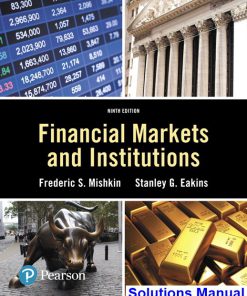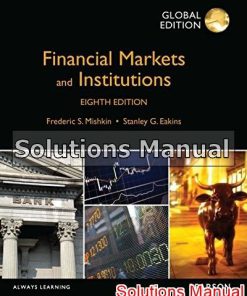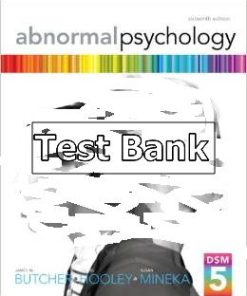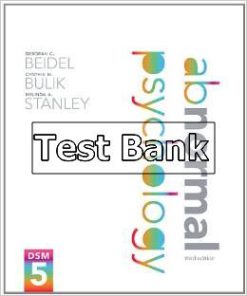Financial Markets and Institutions Global 7th Edition Mishkin Test Bank
$50.00 Original price was: $50.00.$26.50Current price is: $26.50.
Financial Markets and Institutions Global 7th Edition Mishkin Test Bank.
Financial Markets and Institutions Global 7th Edition Mishkin Test Bank

Product details:
- ISBN-10 : 0273754440
- ISBN-13 : 978-0273754442
- Author: Frederic Mishkin
In Financial Markets and Institutions, best-selling authors Mishkin and Eakins provide a practical introduction to prepare students for today’s changing landscape of financial markets and institutions. A unifying framework uses a few core principles to organize students’ thinking then examines the models as real-world scenarios from a practitioner’s perspective. By analyzing these applications, students develop the critical-thinking and problem-solving skills necessary to respond to challenging situations in their future careers. This title is a Pearson Global Edition. The Editorial team at Pearson has worked closely with educators around the world to include content which is especially relevant to students outside the United States.
Table contents:
part 1 INTRODUCTION AND OVERVIEW OF FINANCIAL MARKETS 1 1 Introduction 2 WHY STUDY FINANCIAL MARKETS AND INSTITUTIONS? CHAPTER OVERVIEW 2 OVERVIEW OF FINANCIAL MARKETS 4 Primary Markets versus Secondary Markets 4 Money Markets versus Capital Markets 7 Foreign Exchange Markets 9 Derivative Security Markets 10 Financial Market Regulation 10 OVERVIEW OF FINANCIAL INSTITUTIONS 11 Unique Economic Functions Performed by Financial Institutions 14 Additional Benefits FIs Provide to Suppliers of Funds 16 Economic Functions FIs Provide to the Financial System as a Whole 17 Risks Incurred by Financial Institutions 18 Regulation of Financial Institutions 19 GLOBALIZATION OF FINANCIAL MARKETS AND INSTITUTIONS 20 2 Determinants of Interest Rates 26 Interest Rate Fundamentals: Chapter Overview 26 Time Value of Money and Interest Rates 28 Time Value of Money 29 Lump Sum Valuation 31 Annuity Valuation 35 Effective Annual Return 37 Loanable Funds Theory 37 Supply of Loanable Funds 38 Demand for Loanable Funds 40 Equilibrium Interest Rate 40 Factors that Cause the Supply and Demand Curves for Loanable Funds to Shift 42 Movement of Interest Rates over Time 45 Determinants of Interest Rates for Individual Securities 45 Inflation 46 Real Interest Rates 46 Default or Credit Risk 47 Liquidity Risk 48 Special Provisions or Covenants 49 Term to Maturity 50 Term Structure of Interest Rates 52 Unbiased Expectations Theory 52 Liquidity Premium Theory 54 Market Segmentation Theory 55 Forecasting Interest Rates 55 Appendix 2A: Construction of a Yield Curve Using the Liquidity Premium Theory of the Term Structure of Interest Rates (at www.mhhe.com/sc3e) 3 Interest Rates and Security Valuation 61 Interest Rates as a Determinant of Financial Security Values: Chapter Overview 61 Various Interest Rate Measures 62 Coupon Rate 62 Required Rate of Return 62 Expected Rate of Return 63 Required versus Expected Rates of Return: The Role of Efficient Markets 65 Realized Rate of Return 65 Bond Valuation 66 Formula Used to Calculate Fair Present Values 66 Formula Used to Calculate Yield to Maturity 68 Impact of Interest Rate Changes on Security Values 69 Impact of Maturity on Security Values 71 Maturity and Security Prices 71 Maturity and Security Price Sensitivity to Changes in Interest Rates 72 Impact of Coupon Rates on SecurityValues 73 Coupon Rate and Security Prices 73 Coupon Rate and Security Price Sensitivity to Changes in Interest Rates 73 Duration 74 A Simple Illustration of Duration 75 A General Formula for Duration 77 Features of Duration 80 Economic Meaning of Duration 81 Large Interest Rate Changes and Duration 83 Appendix 3A: Equity Valuation (at www.mhhe.com/sc3e) Appendix 3B: Duration and Immunization (at www.mhhe.com/sc3e) Appendix 3C: More on Convexity (at www.mhhe.com/sc3e) 4 The Federal Reserve System, Monetary Policy, and Interest Rates 90 Major Duties and Responsibilities of the Federal Reserve System: Chapter Overview 90 Structure of the Federal Reserve System 91 Organization of the Federal Reserve System 91 Board of Governors of the Federal Reserve System 92 Federal Open Market Committee 93 Functions Performed by Federal Reserve Banks 94 Balance Sheet of the Federal Reserve 98 Monetary Policy Tools 101 Open Market Operations 102 The Discount Rate 104 Reserve Requirements (Reserve Ratios) 106 The Federal Reserve, the Money Supply, and Interest Rates 110 Effects of Monetary Tools on Various Economic Variables 110 Money Supply versus Interest Rate Targeting 112 International Monetary Policies and Strategies 115 Impact of U.S. Monetary Policy on Foreign Exchange Rates 115 Challenges of Other Major Central Banks 117 par t 2 SECURITIES MARKETS 121 5 Money Markets 122 Definition of Money Markets: Chapter Overview 122 Money Markets 123 Yields on Money Market Securities 124 Effective Annual Return 124 Discount Yields 124 Single-Payment Yields 125 Money Market Securities 126 Treasury Bills 126 Federal Funds 133 Repurchase Agreements 135 Commercial Paper 138 Negotiable Certificates of Deposits 141 Banker?s Acceptances 143 Comparison of Money Market Securities 143 Money Market Participants 144 The U.S. Treasury 144 The Federal Reserve 144 Commercial Banks 145 Money Market Mutual Funds 145 Brokers and Dealers 145 Corporations 146 Other Financial Institutions 146 International Aspects of Money Markets 146 Appendix 5A: Single versus Discriminating Price Treasury Auctions (at www.mhhe.com/sc3e) Appendix 5B: Creation of a Banker?s Acceptance (at www.mhhe.com/sc3e) 6 Bond Markets 154 Definition of Bond Markets: Chapter Overview 154 Bond Market Securities 155 Treasury Notes and Bonds 155 Municipal Bonds 169 Corporate Bonds 174 Bond Ratings 180 Bond Market Indexes 182 Bond Market Participants 183 Comparison of Bond Market Securities 183 International Aspects of Bond Markets 184 Eurobonds, Foreign Bonds, and Brady and Sovereign Bonds 187 Eurobonds 187 Foreign Bonds 188 Brady Bonds and Sovereign Bonds 188 7 Mortgage Markets 192 Mortgages and Mortgage-Backed Securities: Chapter Overview 192 Primary Mortgage Market 194 Mortgage Characteristics 194 Mortgage Amortization 200 Other Types of Mortgages 205 Secondary Mortgage Markets 207 History and Background of Secondary Mortgage Markets 207 Mortgage Sales 208 Mortgage-Backed Securities 208 Participants in the Mortgage Markets 214 International Trends in Securitization 216 Demand by International Investors for U.S. Mortgage-Backed Securities 216 International Mortgage Securitization 216 8 Foreign Exchange Markets 220 Foreign Exchange Markets and Risk: Chapter Overview 220 Background and History of Foreign Exchange Markets 221 Foreign Exchange Rates and Transactions 223 Foreign Exchange Rates 223 Foreign Exchange Transactions 224 Return and Risk of Foreign Exchange Transactions 227 Role of Financial Institutions in Foreign Exchange Transactions 232 Interaction of Interest Rates, Inflation, and Exchange Rates 236 Purchasing Power Parity 237 Interest Rate Parity 239 Appendix 8A: Balance of Payment Accounts 9 Stock Markets 244 The Stock Markets: Chapter Overview 244 Stock Market Securities 246 Common Stock 247 Preferred Stock 251 Primary and Secondary Stock Markets 252 Primary Markets 252 Secondary Markets 257 Stock Market Indexes 267 Stock Market Participants 271 Other Issues Pertaining to Stock Markets 272 Economic Indicators 272 Market Efficiency 274 Stock Market Regulations 276 International Aspects of Stock Markets 278 Appendix 9A: The Capital Asset Pricing Model (at www.mhhe.com/sc3e) Appendix 9B: Event Study Tests (at www.mhhe.com/sc3e) 10 Derivative Securities Markets 284 Derivative Securities: Chapter Overview 284 Forwards and Futures 285 Spot Markets 286 Forward Markets 286 Futures Markets 287 Options 295 Call Options 295 Put Options 297 Option Values 299 Option Markets 301 Regulation of Futures and Options Markets 307 Swaps 307 Interest Rate Swaps 308 Currency Swaps 311 Swap Markets 312 Caps, Floors, and Collars 313 International Aspects of Derivative Securities Markets 315 Appendix 10A: Black?Scholes Option Pricing Model (at www.mhhe.com/sc3e) part 3 COMMERCIAL BANKS 319 11 Commercial Banks: Industry Overview 320 Commercial Banks as a Sector of the Financial Institutions Industry: Chapter Overview 320 Definition of a Commercial Bank 322 Balance Sheets and Recent Trends 322 Assets 322 Liabilities 324 Equity 326 Off-Balance-Sheet Activities 326 Other Fee-Generating Activities 329 Size, Structure, and Composition of the Industry 330 Economies of Scale and Scope 331 Bank Size and Concentration 334 Bank Size and Activities 335 Industry Performance 336 Technology in Commercial Banking 338 Wholesale Banking Services 338 Retail Banking Services 339 Regulators 341 Federal Deposit Insurance Corporation 341 Office of the Comptroller of the Currency 341 Federal Reserve System 342 State Authorities 343 Global Issues 343 Advantages and Disadvantages of International Expansion 343 Global Banking Performance 345 12 Commercial Banks? Financial Statements and Analysis 349 Why Evaluate the Performance of Commercial Banks? Chapter Overview 349 Financial Statements of Commercial Banks 351 Balance Sheet Structure 352 Off-Balance-Sheet Assets and Liabilities 358 Other Fee-Generating Activities 363 Income Statement 364 Direct Relationship between the Income Statement and the Balance Sheet 367 Financial Statement Analysis Using a Return on Equity Framework 368 Return on Equity and Its Components 370 Return on Assets and Its Components 371 Other Ratios 374 Impact of Market Niche and Bank Size on Financial Statement Analysis 377 Impact of a Bank?s Market Niche 377 Impact of Size on Financial Statement Analysis 378 13 Regulation of Commercial Banks 382 Specialness and Regulation: Chapter Overview 382 Types of Regulations and the Regulators 383 Safety and Soundness Regulation 383 Monetary Policy Regulation 385 Credit Allocation Regulation 385 Consumer Protection Regulation 385 Investor Protection Regulation 386 Entry and Chartering Regulation 386 Regulators 387 Regulation of Product and Geographic Expansion 387 Product Segmentation in the U.S. Commercial Banking Industry 387 Geographic Expansion in the U.S. Commercial Banking Industry 392 Bank and Savings Institution Guarantee Funds 393 FDIC 393 The Demise of the Federal Savings and Loan Insurance Corporation (FSLIC) and the FDIC 394 Reform of Deposit Insurance 395 Non-U.S. Deposit Insurance Systems 397 Balance Sheet Regulations 398 Regulations on Commercial Bank Liquidity 398 Regulations on Capital Adequacy (Leverage) 398 Off-Balance-Sheet Regulations 404 Foreign versus Domestic Regulation of Commercial Banks 404 Product Diversification Activities 404 Global or International Expansion Activities 404 Appendix 13A: Commercial Banks and Their Regulators (at www.mhhe.com/sc3e) Appendix 13B: Proposed Changes to the FDIC?s Deposit Insurance Premium Assessments (at www.mhhe.com/sc3e) Appendix 13C: Calculating Minimum Required Reserves at U.S. Commercial Banks (at www.mhhe.com/sc3e) Appendix 13D: Calculating Risk-Based Capital Ratios (at www.mhhe.com/sc3e) par t 4 OTHER FINANCIAL INSTITUTIONS 413 14 Other Lending Institutions 414 Other Lending Institutions: Chapter Overview 414 Savings Associations 416 Size, Structure, and Composition of the Industry 416 Balance Sheets and Recent Trends 419 Savings Banks 422 Size, Structure, and Composition of the Industry 422 Balance Sheets and Recent Trends 423 Regulators of Savings Institutions 423 Savings Association and Savings Bank Recent Performance 423 Credit Unions 425 Size, Structure, and Composition of the Industry 426 Balance Sheets and Recent Trends 428 Regulators 430 Industry Performance 431 Finance Companies 431 Size, Structure, and Composition of the Industry 431 Balance Sheets and Recent Trends 433 Industry Performance 438 Regulation 439 Global Issues 439 15 Insurance Companies 442 Two Categories of Insurance Companies: Chapter Overview 442 Life Insurance Companies 443 Size, Structure, and Composition of the Industry 443 Balance Sheets and Recent Trends 447 Regulation 449 Property?Casualty Insurance Companies 451 Size, Structure, and Composition of the Industry 451 Balance Sheets and Recent Trends 453 Regulation 460 Global Issues 461 16 Securities Firms and Investment Banks 465 Services Offered by Securities Firms versus Investment Banks: Chapter Overview 465 Size, Structure, and Composition of the Industry 467 Securities Firm and Investment Bank Activity Areas 469 Investing 469 Investment Banking 469 Market Making 470 Trading 471 Cash Management 473 Mergers and Acquisitions 473 Other Service Functions 473 Recent Trends and Balance Sheets 474 Recent Trends 474 Balance Sheet 477 Regulation 479 Global Issues 482 17 Mutual Funds 486 Mutual Funds: Chapter Overview 486 Size, Structure, and Composition of the Industry 487 Historical Trends 487 Different Types of Mutual Funds 489 Mutual Fund Prospectuses and Objectives 494 Investor Returns from Mutual Fund Ownership 495 Mutual Fund Costs 497 Mutual Fund Share Quotes 500 Balance Sheets and Recent Trends 501 Long-Term Funds 501 Money Market Funds 502 Regulation 503 Global Issues 507 Appendix17A: Hedge Funds (at www.mhhe.com/sc3e) 18 Pension Funds 511 Pension Funds Defined: Chapter Overview 511 Size, Structure, and Composition of the Industry 512 Insured versus Noninsured Pension Funds 512 Defined Benefit versus Defined Contribution Pension Funds 513 Private Pension Funds 515 Public Pension Funds 522 Financial Asset Investments and Recent Trends 523 Private Pension Funds 523 Public Pension Funds 524 Regulation 526 Global Issues 528 par t 5 RISK MANAGEMENT IN FINANCIAL INSTITUTIONS 533 19 Types of Risks Incurred by Financial Institutions 534 Why Financial Institutions Need to Manage Risk: Chapter Overview 534 Credit Risk 535 Liquidity Risk 538 Interest Rate Risk 540 Market Risk 542 Off-Balance-Sheet Risk 543 Foreign Exchange Risk 545 Country or Sovereign Risk 547 Technology and Operational Risk 548 Insolvency Risk 550 Other Risks and Interaction among Risks 550 20 Managing Credit Risk on the Balance Sheet 554 Credit Risk Management: Chapter Overview 554 Credit Analysis 558 Real Estate Lending 558 Consumer (Individual) and Small-Business Lending 562 Mid-Market Commercial and Industrial Lending 562 Large Commercial and Industrial Lending 569 Calculating the Return on a Loan 572 Return on Assets (ROA) 573 RAROC Models 575 Appendix 20A: Loan Portfolio Risk and Management (at www.mhhe.com/sc3e) 21 Managing Liquidity Risk on the Balance Sheet 580 Liquidity Risk Management: Chapter Overview 580 Causes of Liquidity Risk 580 Liquidity Risk and Depository Institutions 582 Liability Side Liquidity Risk 582 Asset Side Liquidity Risk 586 Measuring a Bank?s Liquidity Exposure 586 Liquidity Risk, Unexpected Deposit Drains, and Bank Runs 593 Bank Runs, the Discount Window, and Deposit Insurance 594 Liquidity Risk and Insurance Companies 597 Life Insurance Companies 597 Property?Casualty Insurance Companies 598 Guarantee Programs for Life and Property?Casualty Insurance Companies 598 Liquidity Risk and Mutual Funds 599 22 Managing Interest Rate Risk and Insolvency Risk on the Balance Sheet 603 Interest Rate and Insolvency Risk Management: Chapter Overview 603 Interest Rate Risk Measurementand Management 605 Repricing Model 605 Duration Model 612 Insolvency Risk Management 619 Capital and Insolvency Risk 620 23 Managing Risk with Derivative Securities 629 Derivative Securities Used to Manage Risk: Chapter Overview 629 Forward and Futures Contracts 629 Hedging with Forward Contracts 630 Hedging with Futures Contracts 632 Options 635 Basic Features of Options 636 Actual Interest Rate Options 639 Hedging with Options 639 Caps, Floors, and Collars 640 Risks Associated with Futures, Forwards, and Options 641 Swaps 642 Hedging with Interest Rate Swaps 642 Currency Swaps 645 Credit Risk Concerns with Swaps 646 Comparison of Hedging Methods 647 Writing versus Buying Options 647 Futures versus Options Hedging 649 Swaps versus Forwards, Futures, and Options 650 Derivative Trading Policies of Regulators 650 Appendix 23A: Hedging with Futures Contracts (at www.mhhe.com/sc3e) Appendix 23B: Hedging with Options (at www.mhhe.com/sc3e) Appendix 23C: Hedging with Caps, Floors, and Collars (at www.mhhe.com/sc3e) 24 Managing Risk with Loan Sales and Securitization 655 Why Financial Institutions Sell and Securitize Loans: Chapter Overview 655 Loan Sales 656 Types of Loan Sales Contracts 658 The Loan Sale Market 659 Secondary Market for Less Developed Country Debt 662 Factors Encouraging Future Loan Sales Growth 662 Factors Deterring Future Loan Sales Growth 663 Loan Securitization 664 Pass-Through Security 664 Collateralized Mortgage Obligation 670 Mortgage-Backed Bond 677 Securitization of Other Assets 678 Can All Assets Be Securitized? 679 References 682 Index 684
People also search:
Financial Markets and Institutions Global 7th
Financial Markets and Institutions Global 7th download
Financial Markets and Institutions Global 7th pdf free
Financial Markets and Institutions Global 7th full version
Financial Markets and Institutions Global 7th download full




















